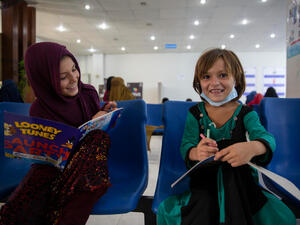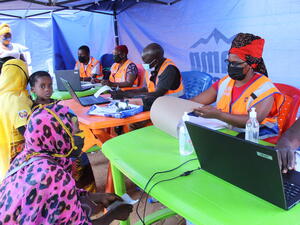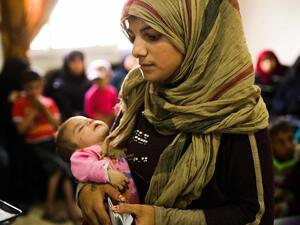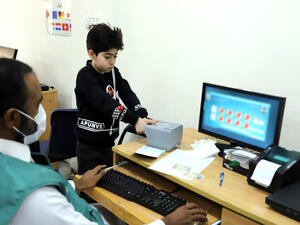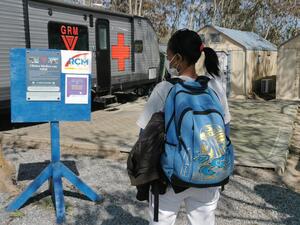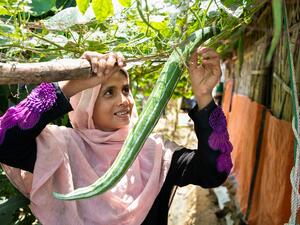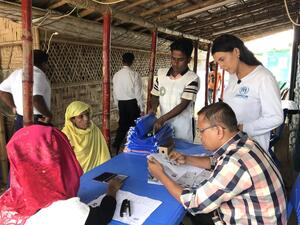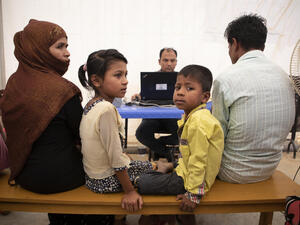Refugees in Iraq camp to enjoy more services, rights after registration
Refugees in Iraq camp to enjoy more services, rights after registration

A refugee and her two children take part in the registration exercise in Makhmour camp.
MAKHMOUR CAMP, Iraq, July 4 (UNHCR) - The UN refugee agency and the Iraqi government have entered the final phase of registering refugees in Iraq with the recent completion of registration in Makhmour camp in the north.
The nationwide registration of refugees in Iraq was initiated by the government in 2008 and seeks to give the refugees a wider range of rights and services, including access to education and health care, and the right to work and travel.
Those registered to date include Palestinian refugees in Baghdad and Mosul as well as Syrian refugees in Mosul. The latest phase of the exercise was completed in Makhmour camp last weekend, registering a total of 10,240 Turkish refugees who received residency documents for the first time.
"It is quite an achievement," said Tarik Kurdi, UNHCR's deputy representative for the Iraq operation. "This registration is about building confidence internationally in the civilian nature of the camp."
Makhmour's inhabitants fled Turkey into Iraq in 1994. They first stayed in Atroush camp near the Turkish border, then split into two groups in 1997. Between 4,000 and 5,000 refugees moved to local settlements in the governorate of Dahuk and Erbil. A larger group relocated to Makhmour camp, which today looks like a small town with mud-brick houses and several shops selling food.
The recent registration was undertaken by Iraq's Ministry of Interior Permanent Committee for Refugee Affairs with help from UNHCR.
"In Makhmour, UNHCR has been assisting in the organization of the whole registration process, including training ministry staff for the collect of data, and providing the appropriate technical equipment," said Iraj Imomberdiev, UNHCR's acting head in Erbil. A UNHCR team of four to six people - including information technology officers - were present during the whole registration which lasted several months in the camp.
Highlighting the importance of the exercise, UNHCR's Kurdi said, "The registration is a crucial step for refugees who will strengthen their refugee status by receiving a refugee residence card entitling them to several benefits, including travelling throughout Iraq without any restriction."
The card is initially valid for one year and thereafter renewable for five years. With it, refugees can be issued a travel document allowing them to travel, for instance for students who want to study abroad. The refugees will also have access to Iraqi courts to register marriages. They will also have the right to medical services and education provided by the government, as well as the right to work.
Some 2,000 refugees from the camp already work in companies or as daily labourers in the nearby town of Makhmour or even in Erbil, 90 minutes away. With the recent the registration, they may be able to access government posts, an opportunity university graduates have requested for several years.
Registered refugees will also have the right to own land, property, cars and businesses. They can receive a public distribution system card from the government, which will entitle them to receive food rations as all Iraqi citizens and residents do.
UNHCR's work in Makhmour includes monitoring the general situation and providing cash assistance on a case-by-case basis to the most vulnerable refugees, such as those with chronic illnesses. The agency also provides transport fees for young refugees studying in Erbil and Dahuk, and conducts protection and social activities for women and youth through two implementing partners.
Following Makhmour camp, UNHCR and the government of Iraq will soon start a new registration of refugees in Barikacamp, home to more than1,900 refugees from Iran.
By Helene Caux in Makhmour Camp, Iraq

